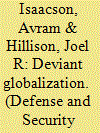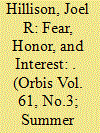|
|
|
Sort Order |
|
|
|
Items / Page
|
|
|
|
|
|
|
| Srl | Item |
| 1 |
ID:
148349


|
|
|
|
|
| Summary/Abstract |
In both Afghanistan and Iraq, US landpower was able to gain control rapidly over terrain. However, that control ebbed as US presence weakened. Non-state actors, such as the Taliban, the Haqqani network, the Islamic State, and Al Qaeda, gained control of segments of the population. Transnational Criminal Organizations capitalized on this permissive environment to strengthen their networks, often eroding the legitimacy of the host nation government, fueling regional instability, and, ultimately, undermining US policy objectives. The proliferation of deviant globalization, or the connectedness of subversive elements, is a key indicator of future conflict. Strategic landpower is uniquely positioned to influence the physical, psychological, economic, and social interactions of various non-state actors and their association with deviant globalization. It is no longer enough to seize and hold terrain. Landpower must also have the capability to influence the actions and attitudes of populations on that terrain wherever and whenever these interactions occur.
|
|
|
|
|
|
|
|
|
|
|
|
|
|
|
|
| 2 |
ID:
155273


|
|
|
|
|
| Summary/Abstract |
The “America First” approach to foreign policy represents an opportunity to reassess relations with Russia. Efforts to deter Russian aggression have failed. Perhaps a new approach is needed. This article uses the lessons of the Peloponnesian War to help guide the West’s approach to Russia. By examining the three motivations for warfare—fear, honor and interest—it is possible to craft a more effective deterrent strategy while avoiding a security dilemma. Current approaches have discounted legitimate Russian fears of NATO and EU encroachment. They also have neglected the role of honor in Russia’s actions and how this impulse frames Moscow’s views of the West. Finally, NATO and the EU have lost sight of Russia’s vital interests in pursuing further eastward expansion. Where the West cannot compromise is on the security of NATO and EU members and the unity of the Trans-Atlantic alliance.
|
|
|
|
|
|
|
|
|
|
|
|
|
|
|
|
|
|
|
|
|